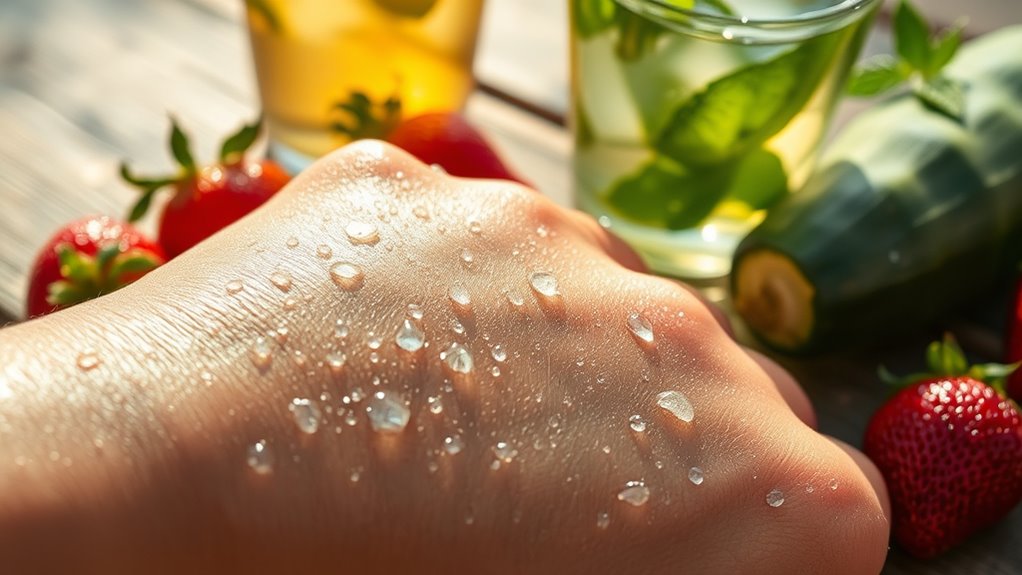To keep your skin hydrated throughout the year, adjust your skincare based on the season. In summer, opt for lightweight, oil-free moisturizers, apply SPF daily, and stay hydrated internally with plenty of water. During winter, switch to richer creams, avoid hot showers, and use hydrating serums with hyaluronic acid. Balancing external products with internal hydration helps maintain healthy, radiant skin, no matter the season—learn more ways to perfect your routine as conditions change.
Key Takeaways
- Adjust moisturizers seasonally: lightweight and oil-free for summer, richer creams for winter.
- Use daily SPF and reapply frequently during summer outdoor activities.
- Incorporate hyaluronic acid serums to boost hydration in both seasons.
- Increase water intake and consume water-rich fruits and vegetables year-round.
- Avoid hot showers in winter and seal in moisture with occlusive layers to prevent dryness.

As the seasons change, so do your skin’s hydration needs. You might notice your skin feeling oilier or drier depending on the weather, which means adjusting your skincare routine is crucial. In summer, your skin faces a different set of challenges, like increased heat, humidity, and sun exposure, making summer skincare a priority. You want to focus on lightweight, oil-free moisturizers that hydrate without clogging pores. Using SPF daily is imperative to protect your skin from UV rays, which can strip moisture and accelerate aging. Incorporate products with hyaluronic acid to boost hydration and maintain a plump, fresh appearance, especially when you’re sweating more. Don’t forget to reapply sunscreen often, especially if you’re outdoors for extended periods. Staying hydrated from the inside helps too—drink plenty of water and eat water-rich foods like fruits and vegetables to support your skin’s summer skincare needs. Additionally, paying attention to your skin’s seasonal hydration requirements ensures optimal health year-round.
As winter approaches, your skin’s hydration requirements shift again. Cold air, wind, and indoor heating strip moisture from your skin, leading to dryness, flakiness, and irritation. To combat this, you need to prioritize winter moisture in your skincare routine. Switch to richer, more emollient creams that create a barrier to lock in moisture and shield your skin from harsh, cold air. Look for ingredients like ceramides, shea butter, and oils that nourish deeply. Avoid hot showers, which can strip your skin’s natural oils, and instead opt for lukewarm water. Use a gentle, hydrating cleanser that doesn’t wash away your skin’s natural oils. Hydrating serums with hyaluronic acid or glycerin can draw moisture into your skin, making your moisturizer more effective. Don’t forget to seal in that moisture with a good occlusive layer during the colder months. If you notice your skin becoming flaky or itchy, it’s a sign you need to increase your hydration efforts or consult a dermatologist for tailored advice. Remember, hydration isn’t just about applying creams; drinking enough water and maintaining a balanced diet rich in omega fatty acids and antioxidants supports your skin from within.
Adjusting your skincare routine with the changing seasons isn’t complicated, but it’s essential. Summer skincare routines focus on protecting and hydrating without overloading your skin, while winter moisture routines aim to deeply nourish and shield your skin from the elements. By understanding these seasonal needs and responding accordingly, you give your skin the best chance to stay healthy, smooth, and radiant all year round. Keep in mind that consistency is key—adapting your routine as the weather shifts ensures your skin remains balanced, comfortable, and well-hydrated no matter the season.
Frequently Asked Questions
How Does Hydration Affect Skin Elasticity During Seasonal Changes?
Hydration plays a vital role in maintaining your skin’s elasticity during seasonal changes. When you’re dehydrated, the effects include dullness and loss of firmness, which can accelerate aging. Proper hydration helps preserve collagen, essential for elasticity and youthful skin. By drinking enough water and using hydrating skincare, you prevent dehydration effects, supporting collagen preservation and keeping your skin supple and resilient through seasonal shifts.
Can Certain Foods Improve Skin Hydration in Winter or Summer?
Yes, you can improve skin hydration by eating seasonal foods like water-rich fruits and vegetables, which boost moisture from within. Incorporate hydrating beverages such as herbal teas or infused water to maintain ideal hydration levels in winter and summer. These foods and drinks help support your skin’s elasticity and prevent dryness, making your skin look healthier and more radiant year-round. Stay consistent for the best results.
Are There Specific Hydration Tips for Sensitive or Allergy-Prone Skin?
Think of your skin as a delicate garden that needs tender care. For sensitive or allergy-prone skin, use hypoallergenic moisturizers to keep hydration locked in without irritation. Stick to gentle cleansing routines, avoiding harsh soaps that can strip moisture. Hydrate from within by drinking plenty of water, and protect your skin from environmental triggers. These simple steps will help maintain a healthy, balanced glow, even when your skin’s extra sensitive.
How Does Climate Humidity Influence Skin Hydration Strategies?
Humidity levels greatly influence your skin hydration strategies. In high humidity, your skin retains moisture more easily, so you can reduce heavy creams and focus on lightweight, hydrating products. Conversely, in dry climates, you should prioritize richer moisturizers and barrier repair. Adjust your routine based on climate adaptation, using hydrating serums in humid weather and more emollient creams when humidity drops, ensuring your skin stays balanced and comfortable year-round.
What Role Do Hydration Supplements Play in Skin Health?
Ever wonder if hydration supplements really boost your skin health? They can play a supportive role by providing extra hydration, especially when your diet isn’t enough. These supplements can enhance skin absorption of moisture and nutrients, helping to maintain a plump, healthy complexion. However, they’re most effective when combined with proper hydration habits. Remember, supplements aren’t a substitute for drinking enough water but a helpful addition to your skincare routine.
Conclusion
As you follow these seasonal hydration tips, you might notice your skin glowing just as the sun peeks through a cloudy sky. It’s funny how a simple drink or moisturizer can make such a difference, like catching a cool breeze on a warm day. So, keep sipping water and moisturizing regularly—sometimes, the tiniest habits can turn a dull complexion into a radiant one, almost as if your skin’s been waiting for the right moment all along.









